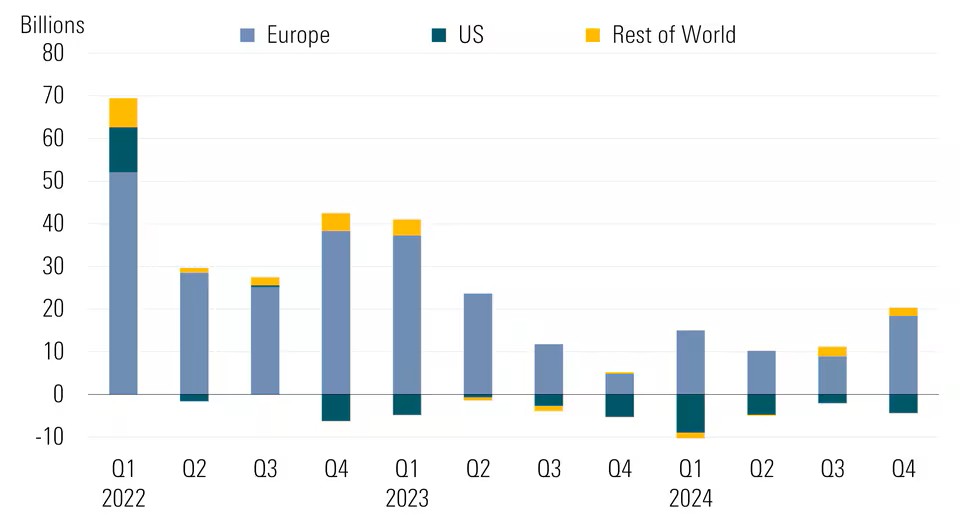
Savings & investment

Here we break down the basics, give some examples of ESG investments and look at factors to take into account if you’re thinking about allocating some, or all, of your capital towards investments that are aligned with strong ESG principles.
Environmental, Social and Governance investing, or ESG investing, relates to a segment of the investment universe where fund managers carry out additional research to understand the environmental, social and governance risks associated with a given company.
‘Responsible’ companies are then seen as those who seek to reduce these risks, minimising their negative environmental and social footprints, and running their businesses in an accountable, open and transparent way.
Investments in companies or organisations such as these expanded swiftly through the early 2020s, reaching an estimated £22.05 trillion in 2022, according to the Global Sustainable Investment Alliance.
More recently, investment research specialist Morningstar has mapped out flows of money into and out of global sustainable funds as follows:

It is important to note early on that there are no universally recognised criteria which define precisely what is or isn’t an ESG investment.
Furthermore, the term ‘ESG’ is also frequently interchanged with terms such as ‘responsible’, ‘sustainable’ or ‘ethical’, making it challenging for the would-be ESG investor to know whether or not a solution really meets their needs.
Here in the UK, the FCA have tried to combat this with the introduction of the Sustainability Disclosure Requirements (SDR), which require UK domiciled funds to meet certain criteria before they can use terms such as ‘sustainable’ or ‘impact’ in their name.
Yet even with the regulations in place, it is still not simple for an investor to be sure that a given investment solution will meet their individual ESG needs – particularly if UK domiciled funds are combined with overseas funds and packaged in to ready-made-portfolio solutions, which do not come under the remit of the previously mentioned naming rules.
As a result, if you are considering ESG investments, it is always a good idea to speak to your financial adviser and look carefully into the detail of any investment solutions that your money is going into, to check that they align with your personal responsible investment needs.
While investors can buy stocks and shares of individual companies that follow strong ESG principles, the simplest route for would-be ESG investors to take is to invest via a ready-made portfolio solution – or MPS – that aligns to your risk profile.
While these portfolios do not need to align with the FCA’s SDR naming rules, they do have to meet a set of stringent anti-greenwashing rules, which means they cannot claim to do anything that cannot be substantiated.
If an MPS claims to exclude producers of tobacco products, these exclusions have to be in place, with data to back up the claim. Likewise, if an MPS claims to invest in clean energy solutions, the data has to be there to verifying that it does, in fact, invest in clean energy solutions.
At Fairstone, we operate a suite of what we call Responsible portfolios.
These are designed for investors who wish to avoid investing in certain areas, while focusing on companies with a positive societal and environmental footprint.
Here’s how our Responsible portfolios line up:
This is an active global multi-asset portfolio range aligned with Fairstone’s responsible investment framework, that combines negative screening (filtering out companies that sit within some of the more controversial sectors), carbon reductions, and positive change.
Our responsible investment framework is supported by two of the leading authorities in ESG investment research – Morningstar and MSCI – allowing us to validate our responsible investment claims and ensure the third-party funds we buy into remain aligned with our process.
The portfolio range uses macroeconomic insights from fund manager JP Morgan to drive long term asset allocation, with shorter term, tactical adjustments made by the Fairstone Asset Allocation Committee. This ensures the portfolios are always positioned in an appropriate way, given the macroeconomic backdrop, while also maintaining their responsible investment objectives.
This portfolio range operates under the same responsible investment framework as the Responsible Active range and follows the same active asset allocation process.
However, where the Responsible Active range uses actively managed third-party funds, the Responsible Passive range invests only in passive third-party funds, which are aimed at tracking specific market indices rather than trying to outperform them.
Both the Responsible Active and Responsible Passive portfolio ranges offer models designed to suit a variety of risk profiles, from lower risk to higher risk.
There has been a lot of commentary, particularly in recent times, about whether it is possible to make a profit while staying true to your responsible investment principles.
Some observers claim that, with opposition to the pursuit of Net Zero hardening in some parts of the world, investments in companies which are focused on cutting carbon emissions could underperform in the future. Likewise, there are risks associated with reducing your investment universe through the implementation of strict, sector level exclusions.
However, others say that companies which are well managed, transparent and consider opportunities and risks around ESG issues carefully are more likely to thrive and could outperform rivals in the future.
As with the definition of what is and what isn’t an ESG investment, there is no clear answer on whether doing good for people and the planet will be better for your bank balance in the long run.
It is up to you as an individual investor as to how you would wish to balance your financial goals with your responsible investment goals.
While you might be filled with passion for doing good with your investments, it is very important to make sure you are doing the right thing for yourself and your family too.
A financial adviser will help you to put potential ESG investments into the context of your overall goals and ensure that where you are thinking of putting your money tallies with your approach to risk and your financial situation.
ESG investing offers the potential to create financial returns and positive environmental and social outcomes, but do your research to ensure that where you are putting your money matches your aspirations.
Taking expert financial advice can help with this process and enable you to understand the potential risks and rewards.
If you’re considering investing in ESG companies, get in touch with a financial adviser today.
| Match me to an adviser | Subscribe to receive updates |
It is important to note that with these portfolios, as with all investments, the value of investments and the income from them can go down as well as up and that you may get back less than the amount you invested.
This article is for informational purposes only and does not constitute financial, tax, or legal advice. Tax treatment depends on individual circumstances and may change. Always seek professional advice before making financial decisions.